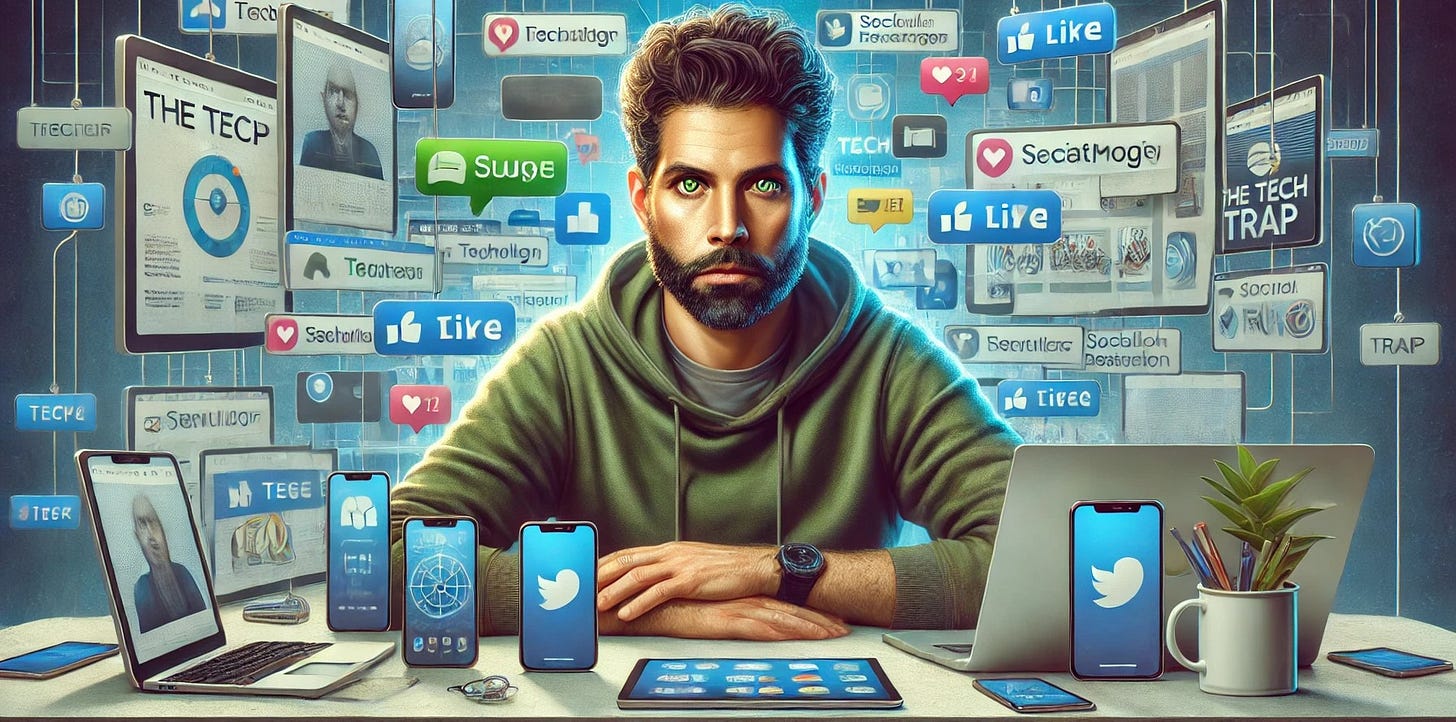The Tech Trap: How Technology Hijacked Our Focus
Discussing shortened attention spans, The loneliness epidemic... and what we can do about all of it.
It’s no secret that we’re part of a new dawning age of technology, which at the time of this writing seems like it has a limitless ceiling in front of it. How far it will go forward in terms of advancement is a mystery, but what we can look at is how it has changed us so far. When people think about technology, first thoughts bring about an exciting mood where we think of how it makes our lives easier, more enjoyable, and less hectic. But there is always another side to be aware of when taking the easier path. The side of “Will there be any consequences for taking this easier, more popular road?”
Enough time has passed and we have adequate data on some ways technology has changed us, which may not all be good. I’m going to talk about those here. I’m also going to talk about some ways where we can regain our strength and set limits down the road so that we can best enjoy technology and take advantage of its benefits while still protecting ourselves. I do not believe technology is evil; like anything else, it should have its limits and be understood. Otherwise, abusing it will have its consequences just like anything else.
Side Effects of Excessive Technology Use
Shortened Attention Span: This is one of the largest concerns from excessive technology use, specifically screen viewing time. A shorter attention span affects nearly all aspects of our daily lives and infringes on the most important factors including our relationships, work, family life, and free time. Having a shorter attention span means that there will be more difficulty enjoying the most important moments in life. This is so common nowadays that it has almost been normalized, and awareness of this problem is not noticeable. This is one of the most dangerous places to be in. When you can’t see a problem, there can be no recovery plan or solution. It’s quite the trap to be in.
Difficulty focusing and committing to things long-term: Here we see things such as “shiny object syndrome”, impulsive decision-making, and other quick actions that often jump from one thing to another. Why? Because with a shorter attention span, the mind quickly gets bored of things that are not highly stimulating, and most newer things only carry a high level of stimulation for a few moments initially. Then, the mind becomes bored and searches for something else to stimulate itself with. So why does this happen? It happens because devices like televisions, phones, and tablets bring about such high levels of stimulation, which moves our stimulation thresholds higher overall. These devices can keep a high level of stimulation because they are everchanging, offering something new and exciting to explore. They also already carry many options to keep you interested such as messages, email access, Netflix, and games. And here’s the kicker. It never gets boring because these examples present you with new material often. If they didn’t you would get bored of them, lose interest, and direct your attention to something else. Technology is a true master at holding our attention.
Loneliness, Weak Relationships, Conversation anxiety: In the world of relationships, technology can steal away our attention, and too much of it can steal valuable time away from our friends and loved ones. This may not seem like a huge issue, but human beings crave connection and a sense of belonging. It’s no secret that technology can take over some or all of our attention, putting us into this introverted world, where our world is reduced to a small screen, and all that exists is what’s on it. When this happens, our partners, kids, friends, and family members can be around us in the same room but feel completely distant and isolated because even though we are in the room, we are not present with them and are not including them. It’s also a lot easier to pick up a device after dinner and decompress in front of it instead of engaging with another family member because that interaction usually requires work, sacrifice, and consistent effort. On the other hand, you can sit in front of a device that doesn’t need anything from you and allows you to safely decompress and entertain your mind without any risk of problems or stress.
There is one big problem with this philosophy that isn’t seen as easily. Hijacking your mind with a device instead of choosing to connect with someone seems easier in the short term, but in the long term, that interaction will bring about less and less pleasure, and create more emptiness. Instead, there is the choice of recognizing that strong, reliable relationships created with work and effort are far more valuable than any of these other short-term pleasures. They will also satisfy you much more fully with longer-lasting fulfillment.
So what’s one way to fix something like this where someone wants to enjoy some entertainment on one of their devices, but also values connections and wants to maintain strong relationships? The first step is realizing that using technology has a price. Another way to put this is that there are benefits to using tech and devices, but there are also some cons we aren’t always aware of. One example of a con is that technology use can rob us of our time. Another could be feeling more alone from weak or lacking connections with others due to excessive technology use. Awareness of this is one of the biggest superpowers here. Being aware of how much technology you’re using will keep you in a conscious state of mind, where you will be more likely to notice if you’re getting enough community time to satisfy that human need. If you’re willing to stay conscious and aware of your tech usage to be sure you’re not alienating your network, you will be in the perfect position to preserve and foster stronger connections with the people around you.
When we look at technology and relationships in this way, it can encourage us to put a limit on our technology use. This allows us to spend enough time with the important people in our lives. Never forget that strong relationships are nurtured and require a consistent effort to be applied on both sides to grow into strong reliable connections. Awareness of this is one of the biggest superpowers here. Being conscious of your daily activities will help you realize if you need to take a break from devices for bonding time where conversation and spending time together becomes the most important thing. Keep in mind that devices can also prevent us from partaking in new things, going out, and meeting new people. If this is what we desire then we also need to make sure that we aren’t using devices as an excuse to be more introverted and shut us out from meeting people, even though that is what we desire.
so what happens if we do nothing…
If no action is taken and we allow ourselves to be completely consumed by the “technological system” I believe that our attention spans will continue to become shorter and shorter, until that limit is reached. We will become increasingly more introverted until even having daily conversations becomes challenging. Having interesting talks and interactions will almost be nonexistent. Patience will also be a thing of the past, and anything that is not instantly gratifying will be ignored, or deemed boring and “not worth the effort”. I believe this would happen specifically because technology rewires our reward circuits to expect everything to come faster and easier. Therefore, it also rewires what is “worth it” to us and what is not. If we are not conscious of this and put a small amount of effort into maintaining our communities and connections humanity will continue to become more and more dull and robotic.
If we look at gatherings and communities 30-50 years ago, they were much more valued back then, stronger in terms of a unit, and people felt more secure in that aspect of their lives where they could rely on more people. Why did things change so quickly in the last 30 years? The internet, smartphones, and technology all created opportunities and encouraged people to travel outside their hometowns to seek a better life.
however, hope is not lost..
If we are aware of the situation and proactive, our networks can remain close, reliable, and trustworthy. As promised, here are some ways where we can choose to reconnect to our more social sides and keep that relationship muscle strong:
Schedule regular catchups with your loved ones: If you’re living in the same household, you can schedule a time to talk about your day, any pressing issues, or interests. A great time to do this is at meals, especially breakfast or dinner. If you live farther away from your loved ones you can schedule weekly catch-up calls to stay in touch, and even upgrade those to video calls for an even stronger connection.
Schedule everyday activities within and around the household such as exercise workouts, gardening, cooking, etc. The idea is to incorporate an activity together that can also spark conversation. For those with connections further away, a weekly call is a great way to share exciting news and keep in touch.
Daily Rituals: Establish daily routines that encourage presence, such as morning coffee without screens or evening walks.
Family Traditions: Create and maintain family traditions, like weekly game nights or Sunday dinners.
By incorporating these habits and activities into your daily routine, you can foster a more present and connected home environment, reducing the reliance on screens and technology. As I said earlier, maintaining awareness of when you’re using tech, especially screens and devices is half the battle. The other half is choosing to consciously integrate mindful activities that include both community and communication.




